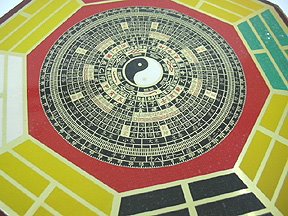 About 1,600 years ago, the Chinese had already determined that there were invisible forces at work beneath the earth. These were later confirmed to be magnetic forces. The Chinese believed these forces were positive (Yang) and negative (Yin) and developed a luopan compass to measure them.
About 1,600 years ago, the Chinese had already determined that there were invisible forces at work beneath the earth. These were later confirmed to be magnetic forces. The Chinese believed these forces were positive (Yang) and negative (Yin) and developed a luopan compass to measure them.Luo means a net that encompasses everything and Pan means utensil or plate. This allegorically refers to the union of Heaven and Earth and specifically to the electro magnetic field that holds all matter together.
Ancient China gave the world several of the mathematical and scientific concepts we take for granted today, such as the compass. The magnetic compass was invented in China for use by Feng Shui practitioners. It was adapted from the "south pointing spoon," or Si Nan. Because of variations over time in the earth's magnetic fields, three compass systems were superimposed over each other during the span of half a millennium to establish the compass that Feng Shui practitioners use today.
The original magnetic compass used for navigation was constructed in the seventh or eighth century with the needle floating in water. The true north-south meridian was first set down by Chiu Yun Han (c. 713 - 741 A. D.) and known as the Cheng Chen. This was used until roughly 880, when readings were so far off the mark that immediate correction was required. In the eight or ninth century it was further refined with the discovery of magnetic declination.
Yang Yun Sang added specialized compass points to compensate for the variation. The Feng Chen or "seam needle" fixed the Cheng Chen's variations. The compass was again adjusted in the 1100s when Lai Wen-Chun came up with the Chung Chen (the central needle). Chinese people used compasses for centuries prior to even the most rudimentary ones on European ships. As late as the seventeenth century, all Western compasses still pointed south just like the ancient south-pointing spoons they were built to imitate.
During the Cultural Revolution (1966-1969), the old ways came under scrutiny once more. While traditional medicine received official sanction from the government, Feng Shui did not. It was eventually outlawed. Ironically, since many Chinese leaders owed their rise to power to Feng Shui, they purposely kept Feng Shui texts hidden from the masses. Today, what little Feng Shui survives in China is under strict control of the Communist government.
Get a Feng Shui Consultation today for your home or office at Feng Shui Style.